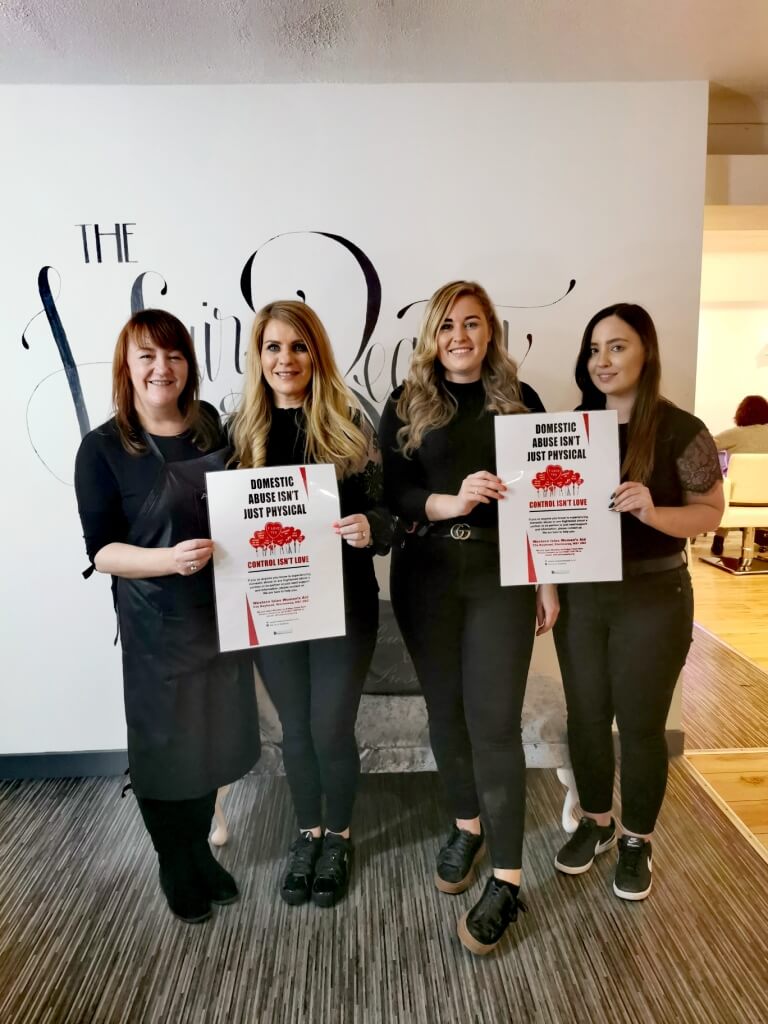Local businesses get behind the Domestic Abuse ’16 Days of Action’ campaign!
Published on 27 November 2019

Local businesses and organisations are getting behind a campaign to raise awareness of Domestic Abuse and Coercive Control.
The ‘16 Days Of Action’ campaign launched on November 25, and local businesses and organisations are lending their support to helping to promote the campaign.
The Outer Hebrides Violence Against Women Partnership, represented by NHS, Local Authority, Police Scotland, Fire Scotland and Third Sector, is seeking to raise awareness across the Western Isles during the campaign, which runs until December 10.
The Partnership is encouraging everyone in the Western Isles to help us raise awareness by following our posts on social media (Facebook – NHS Western Isles or Twitter @NHSWI) and liking or sharing our posts #16daysofactivism #endviolenceagainstwomen #domesticabuse
The campaign is an opportunity for individuals, groups and communities around the world to call for the elimination of all forms of gender-based violence. The campaign runs every year from 25th November, UN International Day of Elimination of Violence Against Women, to 10th December, Human Rights Day, to highlight the link between violence against woman and human rights.
Domestic abuse is a pattern of controlling, coercive, threatening, degrading and/or violent behaviour, including sexual violence, by a partner or ex-partner. Domestic abuse is overwhelmingly experienced by women and perpetrated by men. However domestic abuse can also happen to men. It doesn’t matter how old someone is, what race or ethnicity they are, what class they are, whether or not they are disabled, or whether they have children – anyone can be a victim of abuse.
Often when people think of domestic abuse they think of physical violence, but for many women who live with domestic abuse there will be no scars, bruises or broken bones. However, for some it can take over their lives.
Domestic abuse isn’t a one off. It usually happens again and again and the abusive partner will try different things to gain control. It usually gets worse over time, and for many women it can continue even after the relationship has ended.
Domestic abuse can include, but is not limited to, the following:
- Coercive control (a pattern of intimidation, degradation, isolation and control with the use or threat of physical or sexual violence)
- Psychological and/or emotional abuse
- Physical or sexual abuse
- Financial or economic abuse
- Harassment and stalking
- Online or digital abuse
More than anything, domestic abuse is about control. Coercive and controlling behaviour is a pattern of conduct which undermines the victim’s independence and might include monitoring and restricting mobile phone usage, controlling bank account access, dictating outfit choices, meal times or friendships. Controlling behaviour takes away your choices in life and the things that make you, you.
Domestic abuse has hugely damaging effects on victims, their families and communities and can leave victims feeling isolated, frightened and humiliated.
The new Domestic Abuse Law came into force on 1 April 2019. With 1 in 4 women currently experiencing domestic abuse in Scotland, this new law will make Scotland’s response to domestic abuse fit for purpose for women and children. It allows the police and courts to charge someone for a single offence of domestic abuse, covering both physical abuse and psychological abuse/controlling and coercive behaviour.
The Domestic Abuse Act is the only UK legislation to reflect the harm that can be caused to children growing up in an environment where domestic abuse takes place.
You don't have to wait for an emergency situation to seek help. If domestic abuse is happening to you, it's important to tell someone and remember you're not alone. If you’re not ready to report it, you can still seek support.
If your partner is controlling you, it’s Domestic Abuse.
Regardless of where you live in the Western Isles you can:
Call Western Isles Women’s Aid for support and advice on 01851 704750 Mon- Friday 10am to 5pm. Email: office@wiwasty.org
Women can also call 0808 2000 247, the free 24-hour National Domestic Violence Helpline run in partnership between Women's Aid and Refuge.
Men can call the Men's Advice Line free on 0808 801 0327 (Monday to Friday 9am to 5pm).
You can also speak to a GP, Health Visitor or Midwife.
In an emergency, call 999.
- NEXT PAGE: Sitemap
- LAST REVIEWED ON: January 22, 2020